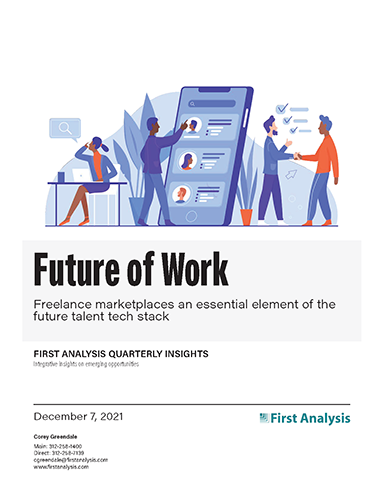Quarterly insights: Future of Work
Freelance marketplaces an essential element of the future talent tech stack

Several forces are converging to make the future of the workforce increasingly fluid. Freelance marketplaces are emblematic of this fluidity, enabling companies and workers to engage far more dynamically than in traditional employment.
The benefits of freelance marketplaces for buyers include the ability to quickly scale labor up or down, to quickly and efficiently source highly specialized skills, and to tap a larger talent pool than with traditional employment. Benefits for freelancers include greater flexibility in how, when and where they perform work and often greater earning potential.
The emergence of multibillion-dollar publicly traded freelance marketplaces highlights the enormous demand among both companies and workers for this more dynamic mode of engaging. Several large companies, each of which addresses a broad swath of skill sets, are the most visible players. However, there are numerous thriving smaller freelance marketplaces that specialize in one or a subset of related freelance segments that have exciting growth prospects. We summarize how freelance marketplaces work and profile several of these specialized freelance marketplaces.
TABLE OF CONTENTS
Includes discussion of FVRR, UPWK and 11 private companies
- Marketplaces will figure prominently in the workforce transformation
- Benefits to organizations using contingent talent via marketplaces
- Benefits to freelancers
- Advantages of marketplaces
- How marketplaces work
- Freelance marketplaces’ win-win proposition suggests a bright future for specialized providers
- Future of work index lags S&P 500 and Nasdaq
- Q4 future of work M&A pace appears to have slowed
- Q4 future of work private placement pace remains strong
Marketplaces will figure prominently in the workforce transformation
Several forces are converging to make the future of the workforce increasingly fluid. Even before the pandemic, many workers were showing a preference for more control over their working lives, remaining with a given employer only for a short time before moving on to their next opportunity or working as a freelancer or gig worker rather than committing their entire work lives to a single company. At the same time, an increasing pace of innovation and a drive to operate more efficiently have made employers more willing to work with labor across classifications rather than relying solely or predominantly on traditional, W-2 type workers. And broad adoption of cloud-native human-capital-focused applications is making it practical for both employers and workers to operate in this more fluid manner. These currents have been accelerated by the pandemic. Workers are demanding more flexibility than ever as the labor supply remains constrained. Employers feel more comfortable with remote labor, filling talent needs with the best available people regardless of their location or classification, and collaborating with talent with very specific skills rather than requiring employees to be generalists.

Request full report
To access the full report, please provide your contact information in the form below. Thank you for your interest in First Analysis research.
